#but it's likely the reason Sunny seemed so scared of Basil in game events was because of this
Explore tagged Tumblr posts
Text




staring at Basil /j (psst read tags it's easier for me to ramble there)
#okay but for real. anyone else think it's interesting how black space entities or whatever seem to behave similarly to Basil#with the not wanting Sunny to leave thing#and no I don't think it's just about Basil btw the similarities also fit with Sunny too and his fight with problems with Mari#but it's likely the reason Sunny seemed so scared of Basil in game events was because of this#I'd be pretty scared too if someone was acting like the monsters in my nightmares..#not to say Basil is a bad person for that of course#or that any of them are monsters#just thinking from Sunny's skewed pov#I don't think it's fair to decide who's actions are worse when they were both struggling#they're like 2 terrified animals if anything#okay ramble over#hope I was able to phrase all the properly </3#chimera babbles
3 notes
·
View notes
Text
reframing Omori, or are the endings really black and white?
MAJOR OMORI SPOILERS FOR EVERY SINGLE ENDING PLEASE PLAY THIS GAME I SWEAR ITS SUPER GOOD PLAY ALL THE ENDINGS (OR AT LEAST KNOW ABOUT THEM IF YOU'RE TOO SCARED TO PLAY THE NEUTRAL ENDING BECAUSE GOD KNOWS I WAS TOO)
TW: SUICIDE, GRIEF, LOSS, DEPRESSION, MENTAL ILLNESS, GAME-TYPICAL CONTENT
THIS IS ALSO REALLY LONG BECAUSE I'M INSANE. SORRY.
Right. This will be a big write-up of multiple interpretations of the different Omori endings. I feel like the game is quite black-and-white with how the endings should be interpreted, the achievements literally state what is good and bad for the player (and "other", which is also referred to as the neutral ending). But I don't think things are as good or as bad or as neutral as they seem.
Let's be explicit here - you're meant to get the good ending. The game does everything it can to ensure you get the good ending - even scrapping a daytime Hellmari jumpscare to ensure the player would keep opening the door for Kel. You're meant to save Basil. You're meant to defeat Omori. You're meant to uncover the Truth. You're meant to sit there and cry when Sunny and Mari play that Final Duet. And also, we like a story where there's the possibility for a happier ending! Don't you want these little babies you've follow around for 20 or 80 hours to get some closure and peace?
For these reasons, the good ending is usually considered canon, and I personally think the secret ending is also canon. I'll also be considering both canon for the sake of this post, although that isn't really relevant, since I'm going through all endings.
With this in mind, let's consider each ending.
THE "GOOD" AND SECRET ENDING.
This one is by far the easiest to flip the switch on. Since it's left ambiguous as to whether or not Sunny is forgiven by his friends, it could easily lead to a far worse ending where Hero throws Sunny down the stairs, or he is never forgiven, or other horrible events occur. Arguably, the point of the game is Sunny's personal acceptance, so whether or not his friends forgive him is so irrelevant that it's up for player speculation.
But that's all so simple, and all personal interpretation. I think considering the actual canon is far more interesting, particularly how it may affect Basil.
You could consider the secret ending to be an objective "good" ending - Sunny and Basil are smiling, and the Somethings fade away. But take a look where each Something goes.

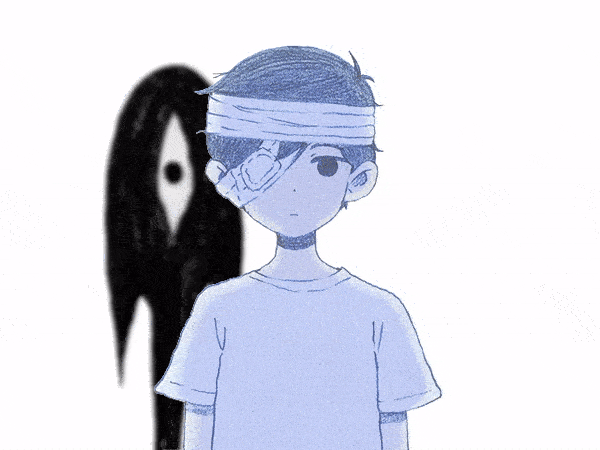
Sunny's fades away entirely behind him, because his character arc surrounds finding and accepting the truth, and this means admitting to his friends what he has done. In this way, he also somewhat frees Basil from needing to obsessively hide the truth from the others, which is part of Basil's character arc, and quite crucial for the specific event that traumatised them both. This is healing specifically from Mari's death and the coverup.
But Basil's Something seems to... hide itself. It doesn't fade. It is still there.
Furthermore, the credits. Despite everything, Sunny does move from Faraway, the credits of a car rolling by definitely suggest this. I also don't think this fight would deter Sunny's Mom from wanting to start a new life - in fact, she'd probably want to do so more.
Basil's abandonment issues are unanswered.
I believe these issues have occurred for longer than the day of the recital - Basil takes photos of things he is "afraid to lose", we know Basil's parents are absent - and therefore they are a separate problem Basil needs to heal from. (omocat make an Omori 2 about basil pls it would be so good i swear i swear)
Basil means a lot to Sunny. We can see this in the numerous Basil-related things that appear in Headspace - all the little flower facts, the photo album's integrity to the group, Headspace's insistence they are best friends - and we juxtapose this to Basil's absolute state of panic over potential further abandonment, which is heartbreaking to witness, ending with his psychotic meltdown, furiously begging Sunny to stop leaving him. The abandonment of Basil had a massive affect on Sunny's mindscape, where his friend is constantly missing and tormented in Black Space, a forever reminder of the truth and the world he shut away. And from the way their Follow-Up Moves work, a hurt Basil is also hurt Sunny.
This comes to my final point - the Good ending is not objectively "Good" because of the implications it has for Basil, who has the ability to influence Sunny. Basil is missing a massive part of his healing, which is often why he is mischaracterised by the fandom as an insane yandere. Sure, the ending has the potential for future healing, but this ending also has the potential for further mental decline, and even points to the latter.
The ending is better than the others, yes. But it is far from a "good" ending.
Whether or not Sunny is aware of all this is up to you, which could be altered by whether or not you believe the two share dreams.
THE "BAD" ENDING.
Obviously the bad ending is bad. I am absolutely not encouraging the events of that ending, and I genuinely thought it was the worst possible ending - you did all that work to seek the truth and mend friendships and it leads to... that? - up until I watched this one amazing animation by _ysther. Please watch it for context.
Rolling Girl is about suicide, or severe mental illness, at least. Many people believe that the 'rolling' within the song is a metaphor for self-harm, but you may also consider that it is a metaphor for some half-baked existence - this feeling of being barely alive, surviving off the next hit of a potential future.
This animation frames the ending in a slightly different way, at least in my interpretation - that Sunny is exhaustedly trudging through Headspace, trying to see if there is something there for him, and there isn't. Omori and Sunny's hug at the end of the animation is notable - Sunny is in his hospital gown, and the headspace background fades through the air... this is implicit of the Bad Ending. This animation ends with the bad ending, and in the context of the song, Omori accepts Sunny's exhaustion, and sets him free.

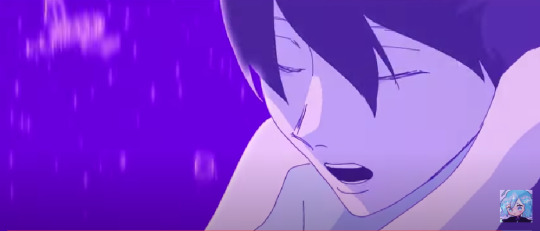
Ultimately, the Truth is overwhelming. That's why Sunny repressed it for four years - it is so horrific that he cannot function in daily life without dissociation, and even with it, he's still a barely functional shut-in. He creates Omori and White/Black/Red Space, and daydreams to cope with his loneliness. At the end of the game, he faces Omori, who convinces him that death is the only option left in a seemingly sadistic way.
But Omori's purpose - just as any mind with suicidal intentions - is not to kill Sunny. His purpose is not only to repress the Truth, but to protect and support him. This is shown in Omori's final hug. When things get overwhelming, Omori convinces Sunny into suicide for their own freedom from suffering. It is a selfish act, which is why Omori spends time deeming Sunny worthy of committing it, but it is also a freeing act.

Furthermore, we know Headspace repeats over, and this repetitive cycle is innate to Sunny's (and many other people's) trauma. Repress, uncover, repress, uncover. Sunny's final fight with Omori was probably not the first, and if Sunny had survived the bad ending, it probably wouldn't have been the last. Omori is the absolute last line of defense, protecting Sunny and his friends from the Truth. This suggests that Sunny wasn't ready for healing, which lead to the bad ending.
The "bad" ending isn't explicitly bad - it is some twisted form of freedom. By killing him, Omori is freeing Sunny from the guilt and pain that has been destroying him for years. This suicide is the ultimate form of self-protection, Omori's final love note to Sunny.
But it is also a symbol of immaturity, though not necessarily a negative one. The bad ending is the implication that Headspace should have repeated, and the Truth needed further repression before Sunny could accept it. Sunny fell into Omori's trap because he simply wasn't ready, and this led to his death.
People always consider this ending in the context of what is best for the group and everyone outside of Sunny's mind, but they don't consider that, to himself and Omori, Sunny is a selfish person who is worthy of one final selfish act for peace.
THE "NEUTRAL" ENDINGS.
While the other segments were focused on greying out the black and white, demonstrating the more subtle implications of the endings, this will be proving that the word "neutral" should never be associated with these endings ever again.
Please note that I am only talking about the neutral endings that occur when you choose not to save Basil on the final night - we will discuss the implications of the Hikikomori route and its endings later.
The neutral endings are, hands down, the worst possible route you can take during the game. One of them is the only ending where three people explicitly die during the game. If you won't take this from a Basil lover, I'm going to prove objectively that this is the worst route for all members of the group, including Sunny.
Firstly, we have to talk about the dialogue that Aubrey, Kel and Hero say when Basil commit suicide.
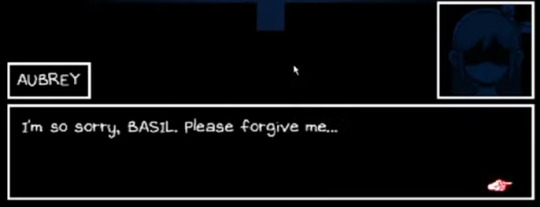
Aubrey thinks it is her fault, for everything she did to Basil. Aubrey will forever blame herself for Basil's suicide, and this quote implies that. Looking at her expression, she's completely despondent. She isn't crying, she is feeling horrific guilt - not unlike the guilt Sunny feels for the truth. She might even slip into his habits of isolation and repression, or perhaps lash out further to cope.
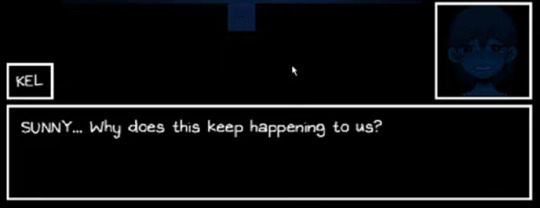
Kel, on the other hand, is crying - which is incredibly notable for him, because his whole thing is ignorance and smiles - but he isn't blaming himself or the group or even Aubrey, but comparing this death to Mari's. Kel is such a complex character that I have difficulty analysing this particular line, but I personally think Kel is holding some of that childlike confusion, something similar to when he interacted with the depressed Hero. Why does this keep happening? Kel holds his own cycle of ignorance, and here it's broken. Perhaps he's questioning his own ability to "be happy" just as much as he is questioning the deaths.
idk. i'd love to here people's takes on this.
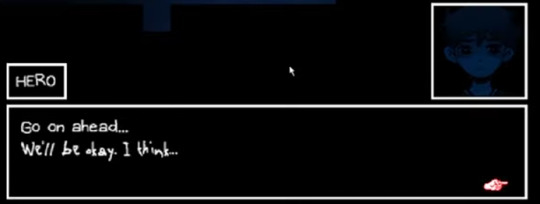
Hero's use of the second font is particularly notable. This font is associated with truth, and in particular, distortion. The most notable characters who use this distorted font are Basil during a breakdown and Omori - both characters associated with severe trauma and repression, trying to hide something. To me, this suggests that Hero is next.
Hero feels like he is the caretaker of the group - and he's failed, again. He thinks he hasn't been doing enough to protect everyone. He may experience another depressive episode, or that same repression followed by obsessively behaviour, trying to keep everyone alive safe. Whatever it may be, Hero is completely broken, as is the rest of the group. This is the end of any remaining functionality that they worked so hard to build up.
After this, viewing Basil's body leads to his door disappearing, as Sunny slips further into his repression. Something is yet again behind Sunny in the mirror, reminding him of the Truth.
I want to now draw your attention to something stated by the disembodied voice in the Map of Truth.

'They' is referring to both Basil and Mari, and at this point, Basil and Mari are dead. Sunny is the only person still alive who knows the Truth.
There is no way he can live with this, which is why the Knife Ending is readily accessible - but only if you explicitly seek it out. Within the knife ending, a dial-up rings forever for a call that will never be answered, as Sunny bleeds out on his bed. Sunny's Mom has lost both her children, and Kel, Aubrey and Hero have lost three of their friends, close enough to be family. This is in no way a "neutral" ending, this is the worst case scenario.
But even the Abandon Ending is unbearable. Sunny is the only one left who knows the truth of Mari's death. Implicitly, he has also killed Basil by the player's choice not to save him - which you could take as suggesting he somehow knew Basil was going to die.
The game shows to us that complete repression of the Truth is not possible. Even in the Hikikomori route, cracks of the Truth show in abstract ways - including Black Space 2 and the simulated Mari fight are good examples, as well as the horrific repeated jumpscares prevalent on the night in the real world before moving day. Even if Sunny moves away from the two ghosts he left behind, he will never be able to repress the Truth forever.
These endings are in no way neutral, and I think that's obvious to everyone. These are the worst endings you can receive, even the biggest Basil hater couldn't stomach all of this. I think.
THE HIKKIOMORI ROUTE.
If the good ending has elements of bad, and the bad ending has elements of good, and the neutral endings...
Well. Then the Hikikomori route is the perfect combination of both good and bad. It captures perfect game mechanics, and the peak of repression, but in some ways, it is the worst route you could consider taking.
On one hand, it's the perfect route for die-hard players. Peak exploration, unique information, the chance to level up and buff your characters, free access to the photo album, boss rush, and so much more. I personally love it, and I carefully plan out every aspect of what I'll do on that One Day Left. For Sunny, it is also a symbol that Omori has achieved his goal of "repression", or the façade of it, and will now sleep forever in peace. Dreamworld Basil is no longer a threat to Omori's perfect world (of which the meeting of the two literally felt like a wedding) and defeating the three Somethings achieves repression. Everything is okay, in Sunny's head.
On the other hand... it's the guiltiest route. The player is making an active decision to reject Kel and reality, which makes you feel guilty. It is incredibly difficult to take this route by pure accident, unless you were paralysed by the Hellmari jumpscare the night before. Unlike the other endings, Sunny never sees the truth in this route, only distorted fragments in Black Space and Black Space 2. Sunny never experiences the Something boss fight, but does still experience a Stranger fight, Headspace's final prayer to accept the truth, before Omori takes over forever.
And I don't know about you. But watching that piano fade away in the Lost Library... I felt shameful. It makes you want to apologise for the world you left behind.
It's quite easy to forget all this in the blur of Headspace, but Basil and Mari at the picnic blanket are a constant reminder. The blanket represents safety and protection, both for the party, but also the two left behind in it. Perhaps the fact he is present in the picnic blanket specifically suggests that Sunny is somewhat aware that Basil has committed suicide.

This route's endings are no more notable than the neutral endings, except Basil doesn't explicitly die in them, but it can be inferred he does from the results of the neutral endings. But the fact that we cannot confirm this just brings back that regret - Sunny has abandoned Basil and his old friends forever, for unrealistic Headspace reflections that Sunny made up. As I stated before, there is no way the Truth can be repressed forever, but it's pure speculation as to what happens after you abandon the group on the Hikikomori route.
thanks for reading, lol. i don't know how to conclusion. let me know your thoughts! this almost felt like stating the obvious half the time but i dunno, it felt cathartic to write.
i may write something about my journey with omori and i may not. this is a place for me to, idk, ruminate on things. i hope i don't become obsessed.
#spoilers#omori spoilers#omori analysis#omori#omori endings#ive been thinking about this for ages#bc it kinda annoyed me how black and white everything is#when the whole game is about how you shouldn't think black and white (at least morally)#but i digress#omori game#omori sunny#omori basil#tw: suicide#tw: death#tw: self harm#tw: omori-typical content#can you tell i ship sunflower#this is so fucking rambly#sentience's stuff
15 notes
·
View notes
Text
Sup; it’s Omori fronting right now.
We’re on a long car ride, so I’m listening to my playlist, and there’s one song on it that gives me so many thoughts about source, so I decided to write about it cause it’s pretty much the same as the original game and why not.
Under a read more because it’s long, major OMORI spoilers, and a tw for SH (in the song lyrics; it’s the main theme) and suicide (mentioned in the analysis/connection).
The song is “Under the Knife” by Icon for Hire; link to the YT video is under the cut too if anyone wants to listen along.
youtube
“This is the song I'm too scared to write
But some of you may need it tonight
Oh there you were, heart made of glass
Fragile little thing, shattered too fast
Had to pick the pieces up, up, up
And that's why you first got cut, cut, cut”
Sunny was young, “fragile” when the accident happened and Mari died. In him “picking up the pieces,” he found his unhealthy coping mechanism: escaping into HEADSPACE.
“The devil drew you in, you didn't let it show
Didn't want the others to ever have to know
That you were getting hooked on up, up, up
And all you had to do was cut, cut, cut”
This is Sunny hiding the truth about Mari; the others didn’t have to know in his and Basil’s eyes at the time, and he himself also hid and got “hooked up” by going into HEADSPACE and living there like everything was ok, at least as much as he could.
“You carved a special place for your pain
So it came back to hurt you every night
You closed your eyes and wished it all away
Until you disappeared under the knife”
The song’s chorus. The “special place for your pain” can clearly be connected to HEADSPACE, and this is further cemented by the following lines about it being every night, and closing your eyes and disappearing. The “it came back to hurt you every night” also connects to SOMETHING and other reminders of the accident appearing in HEADSPACE along with the good parts.
“You knew the deal, no one gives a damn
Just another needy kid, sob story in hand
Keep your secrets covered up, up, up
We don't need another cut, cut, cut”
More talk of keeping secrets covered up. Also the line about a needy kid and a sob story can also connect to Sunny’s guilt, with him blaming himself for Mari’s death despite it being a frustration-fueled accident. That’s his “sob story;” the circumstances around the incident. He doesn’t want pity for what lead up to the event; he just sees the incident itself as what he should be judged for.
“But you couldn't hide, a heart made of glass
You pull yourself together with all the strength you had
You were finally fed up, up, up
Finally had to scream enough-nough-nough”
This goes to the True Route, with Sunny facing the truth, facing Basil, and facing Omori. He pulled all his strength to finally face it all, and fight to tell the truth.
“You carved a special place for your pain
So it came back to hurt you every night
You closed your eyes and wished it all away
Until you disappeared under the knife”
The chorus once again. With the context of the previous verse, this can be connected to the Omori fight, with how defeat under Omori’s knife is inevitable, and the verse can more directly reference the True Route Bad Ending, with Sunny actually disappearing under the knife.
“Listen, I know it's simplified from the other side
It's easy to gloss over all the messy reasons why
And it's easy to forget where you've been
I guess that's what the scars are for, huh”
The “glossing over all the messy reasons why” can go back to what we said about the “sob story” line, with Sunny ignoring the circumstances of the accident and blaming himself despite everything. And the “forgetting where you’ve been” can be how he blocked out the memories of the incident, but the scars on his mind keep reminding him.
“When we were 15 we wouldn't dare let that shit be seen
But now it seems mutilations gone mainstream
I see you at my shows, scarred up from head to toe
Like there's no point even trying not to let it show
Cause we all know "Emo kids like to hurt themselves"
Too many feelings, and not enough self control
And I mean does this mess with any of the rest of ya
It's an epidemic and we're cool with it don't question it
But it bothers me our scars are currency by which we're measured
Like let the records show who let it slip and who held it together
Cutters and burners and honorable mentions
Posers who still cut themselves up for the attention”
Not really sure how to connect this part, since it’s a commentary on irl issues related to societal views on SH.
“I don't care your intentions I just want you to know
My self hatred never took me where I wanted to go
At the end of the day, you know I still had to face
That I can pick at the pain, but I can't cut it away”
This is Sunny realizing that he can’t stop the pain from the accident by just running away and pushing it back down whenever the truth comes back up. He has to face it, and his self hatred from it, head on, and this happens in the form of fighting Omori.
“And you know what else I can't do, is give you ten good reasons not to
I've racked my brain with clever sayings of all the things you ought to do
But you know I think if there was something I could say
They would've thrown it on a brochure and sent you on your way”
This part is a little tricky to put into words. The best we can come up with is it being how Sunny couldn’t get rid of his pain so easily; he couldn’t just go into HEADSPACE and pretend nothing happened. In all of the game’s endings nothing that anyone could have said to him would have kept him from committing suicide; it was all up to his (or if we’re being meta, the player’s) decisions: to grab the knife or not; to give up to Omori or not.
“So I'll keep doing what I always do
Drag my heart to the piano and make it sing for you
I'll keep doing what I always do
Drag my heart to the piano and let it sing for you
Drag my heart to the piano and let it sing for you”
The piano singing is Mari and/or the Final Duet (if you’re going Good Ending); pretty self explanatory.
Some things may be a bit off since some of it is pulled from my source memories, but whatever; it still applies to the game mostly.
#omori#omori sunny#song analysis#media song analysis#media song connection#tw sh#tw suicide#omori spoilers#Youtube
2 notes
·
View notes